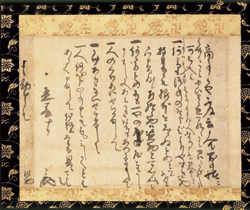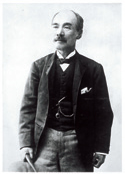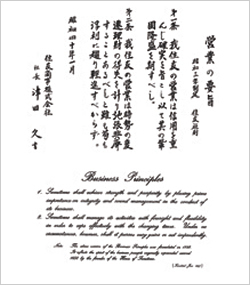- Structures to Support Business Activities
-
- Corporate Governance
- Sumitomo's Business Philosophy / Sumitomo Corporation Group's Corporate Mission Statement
- Corporate Governance System
- Internal Control and Internal Audits
- Compliance
- Risk Management
- Human Resource Management
- Towards a Better, Sustainable Society (CSR)
- Message from the Chair of the CSR Committee
- Environmental Initiatives
- Social Initiatives
Sumitomo's Business Philosophy / Sumitomo Corporation Group's Corporate Mission Statement
Sumitomo has always been sincere in conducting its business, contributing to achieving prosperity and realizing the dreams of our business partners, our society and all other stakeholders. As a result, we have built up trust, and this has helped us to develop new businesses and create a cycle of positive growth. The Management Principles and Activity Guidelines of the Sumitomo Corporation Group are founded on Sumitomo's business philosophy, which has been passed on for 400 years.
1600
The Founder's Precepts "Monjuin Shiigaki"

Monjuin Shiigaki
(Source: Sumitomo Historical Archives)
The Founder's Precepts "Monjuin Shiigaki" is a letter sent by Masatomo Sumitomo (1585-1652), the founder of Sumitomo and a religious man, to his family members in his old age. It succinctly describes the guiding principles of his business operations.
At the beginning, it urges the reader, "Not only in matters of business but in all situations, make efforts with deepest gratitude in every aspect."
The precepts also include such teachings as, "When goods are offered to you below the normal market price, under no circumstances should you ever purchase such goods, for their origins are unknown and they are probably stolen property," "Never give shelter to a stranger, no matter who it might be; also, never take a stranger's goods into your custody, no matter how innocent they might appear" (these acts were prohibited by the government), and "No matter what someone might say to you, never lose your temper or speak harsh words; politely explain your position until an understanding can be reached." These teachings have been handed down and form the basis of Sumitomo's business philosophy. They are still seen in today's principles, such as "no pursuing easy gains" (i.e., only making a profit on a fairly priced transaction that can be explained with confidence), "compliance" and "integrity and sound management."
1800
Rules Governing the House of Sumitomo

Saihei Hirose, Sumitomo's first Director-General
(Source: Sumitomo Historical Archives)
The Besshi Copper Mine (opened in 1691) encountered many adverse conditions during the Meiji Restoration (in the late 1860s). When the price of copper fell, operating costs increased sharply due to rising prices of rice and other items, and loans to the feudal lords were uncollectable. At one point, it was almost forced to sell out. Saihei Hirose (1828-1914), manager of the mine who later became Sumitomo's first Director-General, acted boldly and modernized the operation with Western style technologies. Hirose's operational reforms saved the mine and its community.
In 1882, when serving as Director-General, Hirose formulated the Rules Governing the House of Sumitomo, which consisted of 19 sections and 196 articles, to reflect the business philosophy the family had followed over its 250-year history. The Rules clearly illustrate Sumitomo's corporate philosophy in Article 3, Section I: "We shall practice sound management in order to cope effectively with the changing times. Under no circumstances, however, shall we pursue easy gains or act imprudently."
1900
Business Principles

Business Principles
In 1891, the Rules Governing the House of Sumitomo were separated into two parts, the family code (corporate rules) and the family constitutions (the principles of the family head), to distinguish ownership from business operations. On that occasion, the principle of "integrity" was introduced and placed at the beginning of the Rules Governing the House of Sumitomo with the principle in Article 3, which then together became the Business Principles. In 1928, while Sumitomo's business expanded into a variety of areas, including the steel, machinery and chemical industries, Sumitomo's Business Rules were established. The two articles of the Business Principles have been passed on for generations and still serve as the corporate rules of all group companies.
Article 1: Sumitomo shall achieve strength and prosperity by placing prime importance on integrity and sound management in the conduct of its business.
Article 2: Sumitomo shall manage its activities with foresight and flexibility in order to cope effectively with the changing times. Under no circumstances, however, shall it pursue easy gains or act imprudently.
Sumitomo Corporation Management Charter

Sumitomo Building Annex where Nippon Engineering's head office was located
The Osaka North Harbour Company Limited, the predecessor of Sumitomo Corporation, was founded in 1919. Later, after World War II, the company changed its name to Nippon Engineering Co., Ltd., starting a new life as a general trading firm. In 1952, when the company was incorporated with the current name, the Business Principles were chosen as the management philosophy for all corporate operations and the foundation to sustained growth.
While Japan's economy was growing rapidly after the war, environmental pollution, inflation and other public issues started to arise. Business corporations and their codes of conduct were challenged to make clear the relationship between the national government and corporations, as well as between citizens and corporations. To respond to this, in 1973, Sumitomo Corporation laid down the Sumitomo Corporation Management Charter, an original charter that consists of the Basic Principles of Management and the Operational Guidelines.
2000
Sumitomo Corporation Group's Corporate Mission Statement
In the early 1990s, the bubble burst, drastic appreciation of the yen continued, and the Japanese economy entered a long period of low growth. Sumitomo Corporation had no choice but to re-examine the status quo of its business transactions and risk management methods. Against this background, there was growing management recognition that the company needed to revert to Sumitomo's business philosophy, which had served as the basis of Sumitomo's business operations and the driving force behind overcoming many crises throughout the last 400 years. This recognition further heightened in 1996, when the copper incident occurred, leading to the 1998 establishment of the Sumitomo Corporation Group's Corporate Mission Statement.
The Corporate Mission Statement, consisting of Management Principles and Activity Guidelines, was compiled based on Sumitomo's business philosophy, which has been nurtured throughout the 400 years of Sumitomo's history, and today's global perspective, in a simple and systematic way.
The preamble to the Management Principles shows the corporate vision: "We aim to be a global organization that constantly stays a step ahead in dealing with change, creates new value, and contributes broadly to society." The first item in the Management Principles, "To achieve prosperity and realize dreams through sound business activities" describes our corporate mission, while the second item, "To place prime importance on integrity and sound management with utmost respect for the individual" shows our management style, and the third item, "To foster a corporate culture full of vitality and conducive to innovation" portrays our corporate culture.
The Activity Guidelines were generated based on these principles to guide employees in their daily business operations.
Corporate Mission Statement
Corporate Vision
We aim to be a global organization that constantly stays a step ahead in dealing with change, creates new value, and contributes broadly to society.
Management Principles
[Corporate Mission]
- To achieve prosperity and realize dreams through sound business activities
[Management Style]
- To place prime importance on integrity and sound management with utmost respect for the individual
[Corporate Culture]
- To foster a corporate culture full of vitality and conducive to innovation
Activity Guidelines
- To act with honesty and sincerity on the basis of Sumitomo's business philosophy and in keeping with the Management Principles
- To comply with laws and regulations while maintaining the highest ethical standards
- To set high value on transparency and openness
- To attach great importance to protecting the global environment
- To contribute to society as a good corporate citizen
- To achieve teamwork and integrated corporate strength through active communication
- To set clear objectives and achieve them with enthusiasm